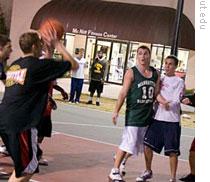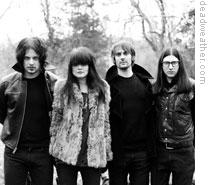2009-8-6
HOST:
Welcome to AMERICAN MOSAIC in VOA Special English.
(MUSIC)
I'm Doug Johnson. Today, we play music from the new band the Dead Weather ...
And we tell you about a film featuring three greats of the guitar.
But first, we answer a question about college life in the United States.
(MUSIC)
College Life
This week's VOA listener question comes from China. Jody Leung wants to know about university life in America.
 |
| Students playing basketball at the University of Tampa in Florida |
Some dorms have a theme, like an international house, where students can learn about other cultures. In language houses, students try to avoid speaking their native language. The idea is to learn a different language.
Many colleges and universities have a Greek system that students can join. This is a social system with fraternity houses for males and sorority houses for females. Members take part in campus activities and volunteer work, and may also live and go to parties at Greek houses.
Colleges and universities often have many clubs that students can join. These include political, religious and service clubs, as well as groups for activities like singing, dancing, cooking, even learning how to juggle.
Schools may also have intramural sports clubs. These are for students who do not play for a school team but want organized sports with other students.
And schools will often recognize a new club or activity if enough students are interested.
But one activity that legally is only supposed to be for people age twenty-one and over is drinking alcohol. Some college presidents and others have suggested that a lower drinking age could have the effect of reducing alcohol abuse. Others disagree and point to a study just published in the Journal of the American Academy of Child and Adolescent Psychiatry.
Researchers found large reductions in heavy, or binge, drinking in young people between nineteen seventy-nine and two thousand six. They said this was likely a result of the legal drinking age being raised to twenty-one and other policy changes aimed at reducing underage drinking.
But they found little improvement for college students. There was no reduction in binge drinking for college men. And college women twenty-one to twenty-three had bigger increases than non-students in that age group.
(MUSIC)
"It Might Get Loud"
HOST:
Filmmaker Davis Guggenheim is best known for "An Inconvenient Truth." That was the movie about former vice president Al Gore and his efforts to fight climate change. The director's newest movie explores a very different subject. Jim Tedder explains.
JIM TEDDER:
"It Might Get Loud" is a film about three generations of guitar superstars: Jimmy Page, the Edge and Jack White. It helps us understand how each one developed his artistry and how each has shaped rock history.
(MUSIC: "Stairway to Heaven")
 |
| The Edge, left, and Jimmy Page |
(MUSIC: "Where the Streets Have No Name")
The Edge is the guitarist for U2. He helped give the Irish band a musical identity with the use of delay effects in repeating notes.
THE EDGE: "I drive everyone crazy trying to get the sound that I hear in my head to come out of the speakers. It's my voice. That is my voice."
(MUSIC: "Steady as She Goes")
And Jack White is the singer and guitarist for the White Stripes and the Raconteurs. He is a rebellious and inventive guitar player heavily influenced by early blues music.
In the movie, we learn about each musician's choice in guitars. And we learn how they got started. We also experience their personal side. For example, the film takes us to the high school where the members of U2 performed together when they were teenagers.
 |
| Jack White |
He wanted to show how three very different artists worked hard to become experts in their art. And he wanted to bring them together to perform. This is Jack White:
JACK WHITE: "I plan to trick both of these guys, that's basically what I am going to do. Trick them into teaching me all their tricks."
We see Jack White, Jimmy Page and the Edge playing together. They exchange stories and teach each other songs. The energy they create fills the room, and their music.
"It Might Get Loud" opens in American theaters later this month.
(MUSIC)
The Dead Weather
HOST:
Jack White can also be found in a new band that he put together in the last year: the Dead Weather. He brought in bass player Jack Lawrence from an earlier band that he created, the Raconteurs. Jack White is the drummer for the Dead Weather. Singer Alison Mosshart comes from the Kills. And guitarist Dean Fertita is a member of Queens of the Stone Age.
Here is Mario Ritter with music from the Dead Weather's first album.
(MUSIC)
MARIO RITTER:
That was "Hang You From the Heavens," the first single released by the Dead Weather. The full album is called "Horehound." Plant biologists may recognize that name as a member of the mint family.
 |
| The Dead Weather |
Jack White has described the sound as "really dangerous and abrasive." If you want some evidence, here is a song called "Bone House."
(MUSIC)
"Horehound" was produced at Jack White's Third Man Records company, which even has its own store in Nashville, Tennessee.
All the members of the Dead Weather had a part in writing the songs on their debut album. But here is one song none of them wrote. We leave you with their version of the Bob Dylan song "New Pony."
(MUSIC)
HOST:
I'm Doug Johnson. I hope you enjoyed our program.
It was written by Marisel Salazar, Caty Weaver and Dana Demange, who was also our producer. For transcripts, MP3s and podcasts of our programs, go to 21voa.com. You can also comment on our programs and send us questions.
Join us again next week for AMERICAN MOSAIC, VOA's radio magazine in Special English.